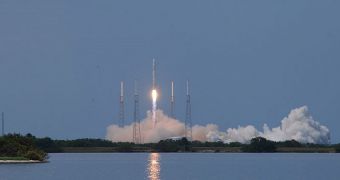Engineers and experts with 21 teams are gathering this week on the Isle of Man, to take part at the Google Lunar X Prize Summit, a discussion with all those involved in the multi-million-dollar effort.
The main goal of this competition is to land an autonomous, private, home-made robot on the surface of the Moon, using a delivery system built by the same team that made the robot.
The competition seeks to promote young talents, and also to demonstrate that space exploration should not be confined to governmental space agencies and large space corporations.
This year's Summit began on Monday, October 4, and participants include representatives from competing teams, Google officials, space industry scientists and engineers, and also representatives from the X Prize Foundation.
All teams involved in this endeavor will have to make a presentation of their approach to fulfilling the goals of the challenge. They will also discuss the judging procedures and the rules governing the challenge.
“We are incredibly excited for this event,” says the X Prize Foundation senior director for space prizes, William Pomerantz. The Foundation is a nonprofit group.
“The Google Lunar X Prize has a great deal of momentum now, with an incredible roster of teams and with major agencies such as NASA stepping up to become customers of our teams,” the official adds.
The grand prize is at this point worth $20 million, and it will be awarded to the team that meets all of the goals in the challenge by the end of 2012.
The highlights of the competition are to build a rocket capable of landing a robot on the Moon, have the machine travel for at least 1,650 feet (500 meters) on the lunar surface, and have it send back high-resolution images of what it discovers.
Thus far, no team has launched its rocket. If none is successful until 2012, then the competition will be prolonged, but the grand prize will drop to $15 million, that will be available until December 31, 2014.
An additional $10 million is set aside for various prizes, bonuses, and for the team that comes in second. The organizers say that, if the robots find water-ice, then their team will get a bonus.
Teams can join the competition until the end of 2010. No further registrations will be possible beyond this deadline, the organizers say, quoted by Space.

 14 DAY TRIAL //
14 DAY TRIAL //